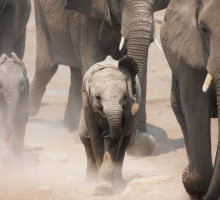‘If you notice anyone falling asleep…you will know that you are boring the hell out of them.’ The President of the Rotary Club pulls my leg during dinner. I can feel a lump of bread the size of a freshly baked roll lodge firmly in my throat and my heart takes pleasure in pounding against my ribs. A nervous laugh squeezes past the lump of bread. I have never embarked on any form of public speaking before and I am so grateful to have my best friend Gary by my side.
I think back to the day towards the end of 2013 when a Zimbabwean contemporary of mine told me in no uncertain terms that there was absolutely nothing that one little person could do to make any difference in the fight against the scourge of poaching. I straighten my shoulders…as just over one year on….I am helping to make a difference. I allow my mind to meander back through the years to the untamed bush that I feel such an enormous part of and I can smell these animals that I am so passionate about and I feel confident that I am ready to stand up and be counted.
I lead the audience back in time embracing the wide open sky and warmth of the African sun that Gary and I have been privileged enough to have spent our entire lives (apart from the last 10 years) enjoying. I share my adoration of these immense creatures with the room offering them a breathtaking glimpse into the world of the elephants. I can feel the emotion clawing up my throat and I want this audience to love and respect these soulful creatures as much as I do before Gary starts his talk with a graph depicting a grotesque and alarming annihilation of these animals and the continual ‘War Zone’ that they are battling to survive in. This is a graph that should shock any thinking and compassionate person into feeling a sense of alarm….and shame.
There is silence in the room and I can see that these men are shocked at the horrific number of elephants that have been slaughtered throughout Africa over the last century and some…Africa’s elephants, rhinos and other wildlife is under attack from poachers, and many species face imminent extinction if the killing continues at current rates.
It is then time to offer what we see as being such a huge part of the solution on the ground.
‘Our mission is to deter the trade of illegal wildlife products by giving existing wildlife protection teams the skills and knowledge they need to protect wildlife and themselves, by educating the market on the destruction caused by the purchase of illegal wildlife products and by creating awareness and gathering support worldwide.’
I can feel myself bursting with pride at what has been achieved. Chengeta Wildlife was started by Lisa Groenweg (USA) in conjunction with Rory Young, a conservationist on the ground. Rory Young, through Chengeta Wildlife has single-handedly trained 120 rangers in different African countries in the last year. He has based his training on the strategies from the ‘A Field Manual For Anti-Poaching Activities’ that he has written in conjunction with Jacob Alexseyev.
Co-author Rory Young explained that through ALERT he intends to provide training free of charge to Africa’s anti-poaching units to increase their effectiveness. The doctrine and training includes: pro-active and reactive investigation techniques to understand the movements, areas of operation and modus operandi of poachers; surveillance and tracking skills to locate the poachers – developed with many years’ experience and incorporating aspects of anthropology, podiatry and forensic science; apprehension techniques to ensure a safe and effective method to capture poachers; and most importantly, how to prevent poaching in the first place. He says, “Training is conducted within local and international laws and adapted to local conditions and sensitivities. Wherever possible local trainers are to be used, and, the training of local individuals able to provide future training, is always the primary goal. What we need is for these improved techniques to spread like wild-fire.”
“This field manual is capable of transforming the fight against poaching dramatically.” -Rory Young
This manual is a first of it’s kind and is currently being put into modules by the University of Coventry. These 120 rangers have returned to their different posts and provided the skills and knowledge they have learnt from Rory to the men under their command.
As a result…750 rangers have now received this comprehensive training.
‘A huge THANK YOU to Joe Chernov, Robin Richards and Leslie Bradshaw for creating the infographic below for Rory Young and Chengeta Wildlife!‘ I urge you all to share the link far and wide for us.
100% of monies raised go directly to funding these training camps and Rory is producing fantastic results. For the past month Rory has been in Liwonde National Park in Malawi. 30 rangers received training and equipment in an advanced ‘Anti-Poaching and Trafficking Course’. A huge part of the training is an ‘In course live anti-poaching’ operation where Rory goes out with the trainees in the field and puts in practice the methods they have learnt during the course. These men have managed to apprehend some 33 poachers in Malawi in the last month.
Chengeta’s reputation is spreading and a further 12 countries have asked for our help….Rory’s itinerary for 2015 is full.
I loved my evening and am delighted that two more talks have been organised with dates to be confirmed and I know that between working with the schools and doing more presentations….our itinerary for raising awareness on the plight of the African wildlife…..
And showing people what Chengeta Wildlife are achieving….our 2015 itinerary is also going to be full. We all have a voice…Please use it.







